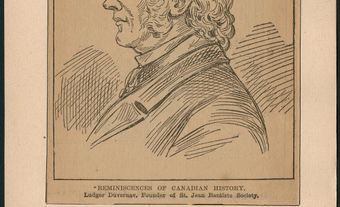This article was originally published in Maclean's Magazine on February 5, 1996
TV Review: Traders
TRADERS
(CanWest Global, Thursdays, 10 p.m.)
Television is chock-full of workaday heroes. It has doctors fighting death and disease, cops soldiering on against crime, and lawyers in search of justice. Now, CanWest Global is throwing something different, if less noble, into that occupational mix with Traders, a dramatic series about investment bankers. Like their public-service TV counterparts, the heroes of Traders struggle valiantly, but not to change the world or solve society's ills. No, these boys and girls in blue - blue pinstripe, that is - risk all to achieve a more morally ambiguous goal: they just want to make gobs of money on Bay Street.
Loathsome? Perhaps. But in fact - and especially when compared with such other Canadian-made series as the now-defunct Street Legal and the CBC's execrable medical soaper, Side Effects - Traders has a lot going for it. Produced by Toronto-based Atlantis Films Ltd., it is remarkable if only for its originality. The world of high finance is unmined territory in North American TV, and it is rich in dramatic possibility. Add to that a capable Canadian cast and better-than-average production values, and Traders promises an entertaining hour of capitalist television. And yet, for all that, something - call it relevance - is lacking in the actual product.
The first episode opens with a scene of frenetic energy: the trading floor of the Toronto investment-banking firm of Gardner/Ross. As head trader Marty Stephens (Patrick McKenna) barks buy-and-sell orders at his underlings, the camera zips unsteadily from face to face to hand to armpit - a Handycam effect so dizzying that it soon becomes nauseating. But even as the traders make their million-dollar deals, Gardner/Ross is a firm in deep trouble. As company president Cedric Ross (David Gardner) stubbornly tries to maintain the firm's independence, Adam Cunningham, a senior partner played with steely pomposity by TV veteran Bruce Gray, is plotting to sell out Gardner/Ross to the highest bidder.
Then, in an unnecessarily over-the-top scene, securities commission agents arrest Ross in connection with the disappearance of $5 million in investors' money. To protect the company's interests against would-be raiders, Ross appoints his daughter, Sally (Sonja Smits), a neophyte economist, to take his place. Another newcomer to the firm is the charismatic Jack Larkin (David Cubitt), a young trader with a checkered past of questionable deals on the Vancouver Stock Exchange. The wisecracking Larkin, whose working-class roots serve only to fuel his ambition, promises to land the firm a coveted share offering - in return for a seat on Gardner/Ross's board of directors. As Sally Ross struggles to assert herself in a male-dominated environment, and as Larkin attempts to prove his worth to the company, big money - and big egos - are on the line.
The atmosphere is tense and serious as the show attempts to portray the gritty reality of life on the street of high rollers. But the première, which is largely concerned with establishing character and premise, seems clunky and uneven. The principals have an annoying habit of stating their personal philosophies at the drop of a hat. (Larkin to a limousine operator: "The world is divided into two kinds of people - those who eat chili dogs and those who travel by limousine.")
Still, at least to an eye untutored in the byzantine ways of high finance, Traders will look convincing. And its depiction of investment banking is largely on the mark - the result of extensive consultation between the show's producers and actual Bay Street traders. The cast, meanwhile, fares admirably with a script that is often lacklustre. In an unfortunate comment on job prospects for Canadian actors, many of them are already highly visible because of their work in commercials. Chris Leavins, for instance, who plays a junior trader, is the spokesman for Nissan automobiles, and Gray does double-duty in commercials for CI Mutual Funds. (Maybe Gray's experience helps, because he is utterly convincing as an investment banker.) Smits, meanwhile, is capable, but unremarkable, as Sally Ross. But McKenna (the goofy Harold on The Red Green Show), who provides manic relief, and relative newcomer Cubitt - as the lovable shark, he is clearly destined to take the romantic lead in upcoming episodes - are both excellent.
The trendicator for Traders suggests a bearish market. CanWest Global is pitting it against the hit medical drama er in the Thursday 10 p.m. time slot - a space that has already proven deadly to the much-hyped ABC show Murder One. And there is a more basic problem: the sense that Traders is already an anachronism. It may be set in 1990s Toronto, but the show and its often-unlikable characters have an Eighties feel about them - espousing a "greed-is-good" ethic that goes largely unchallenged.
But the Eighties are long gone. And in the 1990s - when a lone derivatives trader can bring down a venerable bank, as Nick Leeson did to Britain's Barings PLC last year, and when currency speculators can and do dictate policy to governments around the world - the show's lack of conscience about the consequences of its characters' actions seems at best naïve, at worst lazy and meanspirited. Perhaps those elements will be introduced in later shows. As it stands, Traders has potential - but like stocks in a falling market, it fails to pay full dividends.
Maclean's February 5, 1996

 Share on Facebook
Share on Facebook Share on X
Share on X Share by Email
Share by Email Share on Google Classroom
Share on Google Classroom


